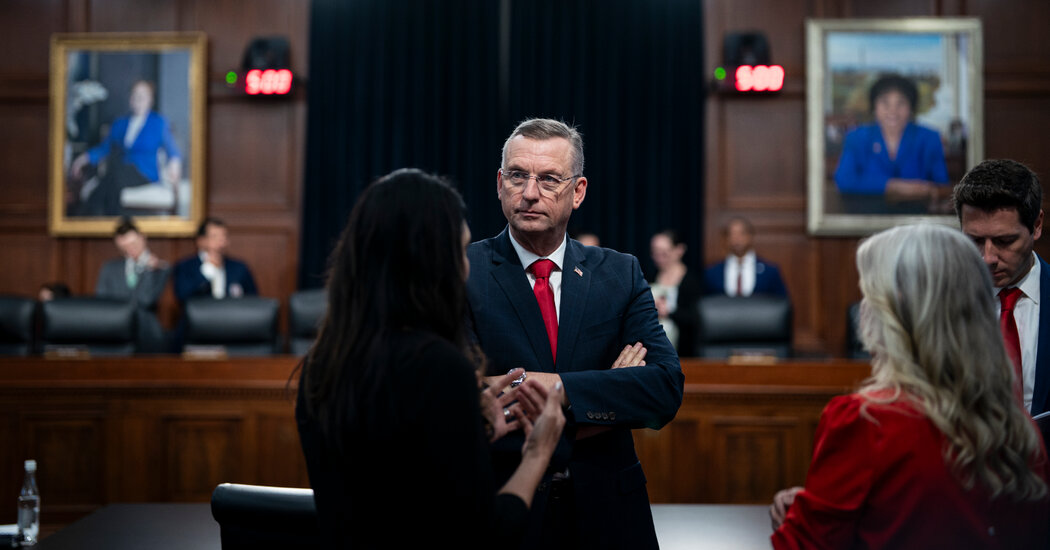A new cheer was introduced during the Rangers’ emphatic Game 1 victory over the Tampa Bay Lightning on Wednesday, when fans at Madison Square Garden demonstrated their devotion to their own Russian goalie over the Lightning’s Russian goalie.
“Igor’s better,” they chanted, over and over.
In that game, Igor Shesterkin, from Moscow, was indeed better than Andrei Vasilevskiy, from Tyumen. But both are generally exceptional goaltenders, arguably the two best in hockey right now. They are also part of an impressive crop of good young Russian goalies sprinkled throughout the N.H.L. — and in particular, the Eastern Conference.
There are 10 Russian-born goalies in the league, and eight play in the East, with more likely on the way.
“Russia is taking over as the predominant goaltending factory in the world,” said Kevin Woodley, the editor in chief of InGoal Magazine and a beer-league goalie near Vancouver, where he lives.
The conference final is providing a showcase for the ascendancy of Russian goaltenders, with their brilliant movement, feline reflexes and puck magnetism. Shesterkin is the favorite to win the Vezina Trophy as the best goalie in the N.H.L.; and Vasilevskiy, who won the award in 2019, is considered the best of the last several years, and the best in playoff competition (Game 1 notwithstanding).
“Andrei is still the best goalie in the world,” Shesterkin said, humbly contradicting the chants after the Rangers beat the Lightning, 3-2, Friday to take a 2-0 lead in the series.
But there are more than just these two. Before facing the Rangers, the Lightning beat the Florida Panthers, and their goalie, Sergei Bobrovsky, who is from Novokuznetsk. Bobrovsky is the godfather of the modern Russian goalie, having won the Vezina twice, in 2013 and 2017, both times with the Columbus Blue Jackets.
A year ago, in the Eastern Conference finals, it was Vasilevskiy against Semyon Varlamov of the Islanders, who is from Samara. The Islanders have two Russian goalies — Varlamov and Ilya Sorokin, who was born in Mezhdurechensk. The Rangers’ backup is Alexandar Georgiev, who was born in Bulgaria, but grew up in Russia and suited up for Russia’s national program.
“There was a time when it seemed every great goalie came out of Quebec,” said John Cooper, the Lightning’s head coach, who added that Finland and Sweden were earlier sources of superb goalie talent. “It’s the Russians’ turn, and you’re getting to see greatness in these two guys.”
But the series is being played at a time when Russia has become a global outcast following its military invasion of Ukraine on Feb. 24. And President Vladimir V. Putin of Russia, a hockey fan, is seen as a pariah in the United States and many other parts of the world.
Nonetheless, Shesterkin and Vasilevskiy are both adored, and it doesn’t stop with them. The Eastern Conference finals features other excellent Russian stars, like Artemi Panarin, the Rangers highly skilled winger; Nikita Kucherov, the Lightning’s dangerous forward; and Mikhail Sergachev, Tampa’s dependable defenseman.
But while other sports have banned Russian teams and their athletes from international sporting events, the N.H.L. did not, because the 57 active Russians in the league play as individuals and do not represent their country or their government in the way an Olympian or a Russian national soccer player does. They represent the Rangers, Lightning and other N.H.L. teams.
Shortly after the invasion, the N.H.L. announced it would suspend relationships with businesses in Russia, paused Russian-language digital media platforms and refused to consider Russia as a site for future competitions involving the N.H.L. But it never considered banning Russian players like Alex Ovechkin, Evgeni Malkin, Vladimir Tarasenko and all the goalies, simply because of their nationality.
In tennis, the French Open allowed Russians to participate, but Wimbledon announced it would ban them because competitors in tennis play under their national flags. Under pressure from the British government, Wimbledon did not want to provide a propaganda victory should a Russian, like Daniil Medvedev, win.
“But if the Rangers win the Stanley Cup, it’s not really a propaganda victory for Russia,” said Timothy Frye, a Russian politics expert at Columbia University and the author of “Weak Strongman: The Limits of Power in Putin’s Russia.”
“Banning team sports, particularly ones that represent Russia, is certainly justified,” he said. “But it would be hard to exclude the hockey players. The hardest one to justify would be banning Vasilevskiy or Shesterkin.”
Frye has traveled to Russia regularly since 1985 and has been to about a half-dozen hockey games there, both before and after the collapse of the Soviet Union. He said that when he watches the N.H.L. now, he wonders why the Russian players aren’t more of a discussion in hockey since the invasion, as opposed to in soccer and tennis.
But he understands why the players are reluctant to speak publicly about the situation.
“Individual Russians take on great risk to express opposition,” Frye said. “A lot of them also have family back in Russia who are vulnerable, and everybody understands that. There is great cost in speaking out. It’s a real thing.”
Frye said there is also the possibility that players could be excluded from Russian national teams in the future, like tennis’s Davis Cup, the Olympic teams or the national hockey and soccer teams. He said even taking a neutral position is frowned upon, and there is the threat of long jail sentences for those who criticize the invasion.
Despite the conflict and uncertainty, the N.H.L.’s Russians play on.
“It has to be an extremely difficult situation,” Cooper said. “When you’ve got a massive ocean in between what’s going on, it probably makes a little bit of a difference.” He added: “Ultimately, it comes down to the guys having to do their job. But it can’t be easy. You just feel for everyone.”
There have been 327 N.H.L. players born in Russia or the Soviet Union, according to Hockey Reference, and only 26 of them were goalies, starting with Sergei Mylnikov, who made his debut with the Quebec Nordiques in 1989. Of the Russian-born goalies, 10 were active this year (11, if you include the Russian-trained Georgiev), and all were born after 1993.
There are many theories about why Russia has become such a mine of goaltending gems. As Cooper said, it might just be their turn. For years it was Quebec, led by Patrick Roy and Martin Brodeur. Then came the era of the Finnish goaltenders, like Tuukka Rask and Pekka Rinne, and finally the Swedes, led by Henrik Lundqvist, another superstar Ranger.
Bobrovsky’s success is seen as a beacon for many young Russians, who want to be like Bob. There is also the theory that Russian coaches have emulated the Swedish model — even translating a Swedish manual for goaltending technique into Russian.
According to Woodley, who has been writing about goaltending for nearly 20 years, one of the key elements is that young Russian goalies are not over-coached. In the early stages of development, child goalies are given time to play and learn largely without extensive, rigid instruction. That, Woodley said, allows young goalies a better sense of the game and enhances their understanding of how the puck will come at them. Later, as teens, they focus on the techniques of movement and positioning.
Woodley said he had also heard of some Russian hockey academies that encourage goalies to participate in other movement-oriented disciplines, like ballet and dance, to strengthen legs and ankles and improve balance and flexibility.
Vasilevskiy, 27, and Shesterkin, 26, are both lauded for their anticipation. Shesterkin’s teammates marvel at how gracefully he moves to stop pucks — and also collect them and make perfect forward passes. Shesterkin has three assists in the playoffs, a new Rangers record for assists in a playoff season.
“His hockey I.Q. is one of the highest on our team,” said Ryan Strome, the Rangers’ veteran center, “and I don’t know if I’ve ever said that about a goalie on my team before, with all due respect. What I mean by that is, he is able to read the plays so intelligently and anticipate where the puck is going to be. And his ability to play the puck is incredible. I’ve never played with a goalie with those capabilities before.”
Rangers fans see all of that, too, and it is why they think Shesterkin is better than Vasilevskiy, better even than all the other goalies, whether Russian, Finish, Canadian or Swedish. For many others, it is a joy to watch them both.
“It’s amazing to think how much everyone loves Igor in New York,” said Frye, the Russia expert. “He is a very captivating player. And of course, winning solves everything.”

